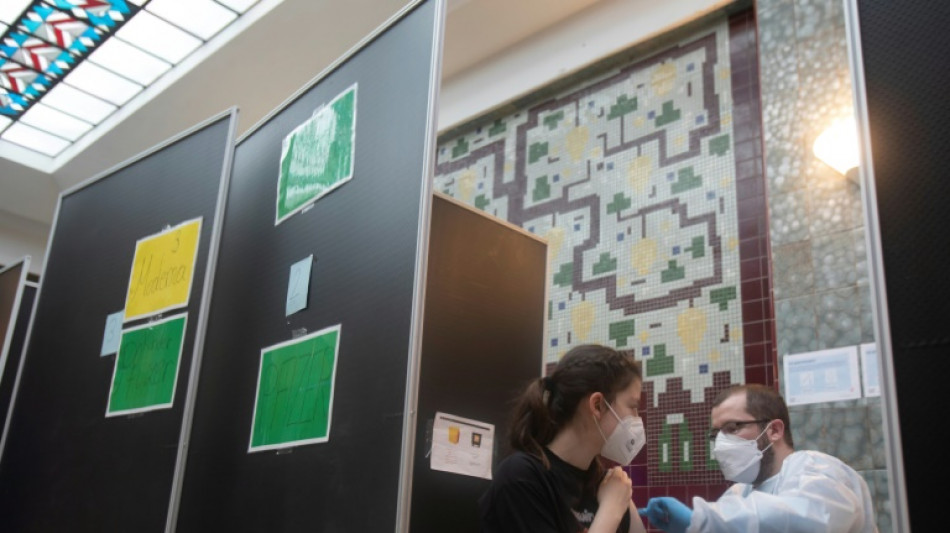
| NGG | 0.27% | 62.54 | $ | |
| RBGPF | 2.67% | 61.84 | $ | |
| GSK | -2.43% | 33.195 | $ | |
| CMSC | 0.18% | 24.595 | $ | |
| RYCEF | 0.44% | 6.82 | $ | |
| RIO | 0.78% | 60.905 | $ | |
| VOD | 0.63% | 8.735 | $ | |
| CMSD | -0.07% | 24.34 | $ | |
| BCC | -0.42% | 139.765 | $ | |
| SCS | 0.3% | 13.31 | $ | |
| BTI | 2.35% | 36.345 | $ | |
| AZN | -2.43% | 63.5 | $ | |
| BCE | -0.11% | 26.81 | $ | |
| RELX | -3.45% | 44.418 | $ | |
| BP | -0.59% | 28.88 | $ | |
| JRI | -0.29% | 13.0391 | $ |
Austria suspends mandatory Covid vaccine law

Austria said Wednesday it is suspending mandatory Covid-19 vaccinations for all adults saying the pandemic no longer poses the same danger, just weeks after the law took effect in an EU first.
The Alpine nation of nine million people was among few countries in the world to make jabs against the coronavirus compulsory for all adults.
The law took effect in February and called for fines up to 3,600 euros ($3,940) from mid-March for those who do not comply.
But minister Karoline Edtstadler said the law's "encroachment of fundamental rights" could no longer be justified by the danger posed by the pandemic.
"After consultations with the health minister, we have decided that we will of course follow what the (expert) commission has said," Edtstadler told reporters after a Cabinet meeting.
"We see no need to actually implement this compulsory vaccination due to the (Omicron) variant that we are predominantly experiencing here."
The highly-contagious variant is widely believed to be less severe than previous strains of the virus, and so far Austrian hospitals have been able to cope with a surge in cases.
This has led to the government to drop most coronavirus restrictions in recent weeks.
The government has stressed it needs to act flexibly in line with the epidemiological situation.
"Just like the virus keeps on changing, we need to be flexible and adaptable," Edtstadler said.
The decision to suspend the law will be reviewed in three months, said Johannes Rauch, who took over as health minister this week as the third since the start of the pandemic.
- Mass protests -
Tens of thousands have demonstrated in regular weekend rallies across the country since the government said last November that it would seek to force people to get jabbed in an effort to boost the staggering vaccination rate.
But the rate of those considered fully protected against the virus has hardly changed in recent week, hovering around 70 percent of the population.
That group includes people who are vaccinated, those who have recovered, or a combination of both.
Calls to review the law -- including from within the ruling conservative People's Party -- have also become increasingly loud as Austria has dropped many restrictions.
As of Tuesday, Austria has recorded almost three million coronavirus cases and more than 15,000 deaths since the beginning of the pandemic in 2020.
The law was adopted by parliament on January 20 with all but the far-right party supporting it and came into effect on February 5.
It applied to all residents above 18 years old with the exception of pregnant women, those who have contracted the virus within the past 180 days and those with medical exemptions.
Tajikistan, Turkmenistan and Indonesia are among the few other countries in the world that also have a mandatory Covid-19 vaccination law for all.
P. Hansen--BTZ

 London
London

 Manchester
Manchester
 Glasgow
Glasgow
 Dublin
Dublin
 Belfast
Belfast
 Washington
Washington
 Denver
Denver
 Atlanta
Atlanta
 Dallas
Dallas
 Houston Texas
Houston Texas
 New Orleans
New Orleans
 El Paso
El Paso
 Phoenix
Phoenix
 Los Angeles
Los Angeles


